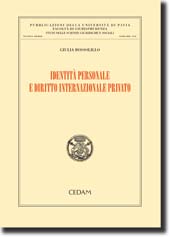Publication: Rossolillo, “Identità personale e diritto internazionale privato”
 A very interesting book on conflict issues arising out of personal identity and name has been recently published by the Italian publishing house CEDAM. The volume, “Identità personale e diritto internazionale privato“, is authored by Prof. Giulia Rossolillo (University of Pavia). Prof. Rossolillo carries on a thorough analysis of PIL issues relating to name, both in its “private” and “public” dimension, taking into account legislation, legal scholarship and caselaw from various national jurisdictions and from the ECJ and the European Court of Human Rights.
A very interesting book on conflict issues arising out of personal identity and name has been recently published by the Italian publishing house CEDAM. The volume, “Identità personale e diritto internazionale privato“, is authored by Prof. Giulia Rossolillo (University of Pavia). Prof. Rossolillo carries on a thorough analysis of PIL issues relating to name, both in its “private” and “public” dimension, taking into account legislation, legal scholarship and caselaw from various national jurisdictions and from the ECJ and the European Court of Human Rights.
An abstract has been kindly provided by the author (the complete table of contents is available on the publisher’s website):
The transnational aspects of personal identity are today subject-matter not only of private international law provisions, but also of the case law of the European Court of Human Rights and of the Court of Justice of the European Communities. Through a comparative approach, this book underlines the role of the principle of continuity and stability of names in these three fields.
As far as private international law is concerned, the two basic functions of the name (expression of one’s personality and identity, and means by which the State identifies the subjects) are mirrored in the functioning of the related private international law rules of many civil law countries. Indeed, one can distinguish conflict of laws provisions concerning the “private aspect” of the name, that is the transmission and changing of it linked to family relationships, and provisions related to the attribution and modification of the name through a public authority act. The first aspect in many continental European countries is regulated by rules referring to the national legal system of the subject as a whole and assuming its point of view, while the so called “public aspect” of the name is generally regulated by unilateral provisions, taking into account only the point of view of the forum State. The underlying idea of the first approach is that the assumption of the point of view of the nationality legal order can guarantee, to a certain extent, the continuity of name every time the person moves from one State to another, whereas the principle of continuity plays a weaker role as regards the second approach. The pivotal role of the principle of continuity comes out, moreover, from national provisions allowing the individual to choose the law that will be applied to his name, like the Swiss private international law provisions giving the individual the opportunity to submit his name to his national law, instead of having it regulated by the law of the State of domicile.
The attempt of balancing private and public interests and the importance of stability for the protection of the personal identity of the individual comes out also from the case law of the European Court of Human Rights. On the one hand the Court gives, in fact, a great importance to State’s interests, but on the other hand these interests are overruled when the interference of the State would lead to oblige the individual to change a name that, having been used for a long time, has become an expression of his personal identity.
The Court of Justice of the European Communities seems, on the contrary, to protect personal identity in a different way: the obligation for every member State to recognize a name given by another member State, envisaged by the Court in the Grunkin-Paul judgment, is, in fact, independent of any effectiveness requirement, that is of the fact that the individual has made actual use of that name, which has become a part of his identity. State interests are, thus, always overruled by the right of the individual to obtain the recognition of his name in the whole Union.
Title: “Identità personale e diritto internazionale privato“, by Giulia Rossolillo, CEDAM (Padova), 2009, XVI – 248 pages.
ISBN: 978-88-13-29065-8. Price: EUR 24,50. Available at CEDAM.


